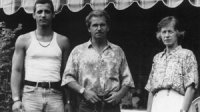
PAREMPAA JA PAREMPAA
 61-vuotiaalla Arminilla on yhä 50-luvun illuusiot tulevaisuuden onnesta ja menestyksestä, vaikkakin kohtalo on päättänyt hänen kohdallaan toisin. Armin löytää itsensä työttömänä. Kahdeksi vuodeksi hän on oikeutettu työttömyysetuihin, mutta sen jälkeen tulevaisuus näyttää ankealta. Armin perustaa kopiointiyrityksen talonsa kellariin vaimonsa ja 30- vuotiaan poikansa avustamana.
61-vuotiaalla Arminilla on yhä 50-luvun illuusiot tulevaisuuden onnesta ja menestyksestä, vaikkakin kohtalo on päättänyt hänen kohdallaan toisin. Armin löytää itsensä työttömänä. Kahdeksi vuodeksi hän on oikeutettu työttömyysetuihin, mutta sen jälkeen tulevaisuus näyttää ankealta. Armin perustaa kopiointiyrityksen talonsa kellariin vaimonsa ja 30- vuotiaan poikansa avustamana.Menestys väistää jälleen kerran Arminia. Liiketoiminta on enemmänkin stressinaiheuttaja kuin tulonlähde. Arminin vaimo, Marlies, yrittää löytää turvallisuutta ja lämpöä liittymällä uskonnolliseen yhteisöön. Heidän poikansa, Markus, tekee ensimmäisen vakavan yrityksen huumeista irtipääsemiseksi. Markuksen vanhin veli, Thomas, kuoli yliannostukseen 1987.
Parempaa ja parempaa (Besser und besser) on sveitsiläinen dokumentti tavallisen, keskiluokkaisen perheen elämästä monien kriisien ristiaallokossa. Perheen tilanne ei ole epätavallinen mutta poikkeuksellista on avoimuus, jolla perheenjäsenet puhuvat siitä. Arminin ja hänen perheensä elämää kuvattiin 1, 5 vuotta. Miksi juuri heitä? Koska he personoivat yhteiskunnan turvattomuutta ja heidän tarinansa koskee meitä kaikkia.
Parempaa ja parempaa sai pitkien dokumenttien pääpalkinnon Nyonissa 1996.
- Ohjaajat: Alfredo Knuchel and Norbert Wiedmer
- Tuotanto: Biograph Film, Switzerland, 1996
In English In English In English
BETTER AND BETTER
 Meet the B family: father Armin, mother Marlies, and son Markus. Armin has been unemployed for more than two years - a hopeless situation for the now 60-year-oold father. As he cannot collect unemployment insurance, he has no choice but to strike out on his own: setting up a small repro business which he runs in his garage, with the help of his wife and his son, who is also unemployed and struggling with drug addiction.
Meet the B family: father Armin, mother Marlies, and son Markus. Armin has been unemployed for more than two years - a hopeless situation for the now 60-year-oold father. As he cannot collect unemployment insurance, he has no choice but to strike out on his own: setting up a small repro business which he runs in his garage, with the help of his wife and his son, who is also unemployed and struggling with drug addiction.The B's situation is not unusual nowadays. What is exceptional, however, is the openness with which they talk about it. Instructive also is the image of the Swiss middle-class which arises out of this close observation of the B's everyday life. Alfredo Knuchel and Norbert Wiedmer were lucky to come across these "protagonists" during their search for the older unemployed people. In the course of three years of filming they experienced, along with the family, what it means to be pushed to the margins. At first in passing, and then increasingly centrally, they document the behaviour, communication problems, small joys and largely unassimilated sufferings of Swiss middle-class life.
Wiedmer's camera is there when the father sharply criticises his wife for escaping into the promised salvation of a cult-like organisation. The camera captures her despairing answer, as she accuses his of wasting his life in front of the TV set. But this proximity is not the speculative intrusion of cheap reality: the result is desperately real. Regina Bärtschi's editing brings the documentary material together so dynamically, one has the impression of watching a fiction film which restores a certain distance. But no fiction film maker could have staged such scenes without falling victim to the utterly banal.
- Directors: Alfredo Knuchel and Norbert Wiedmer
- Biograph Film, Switzerland, 1996

Päivitys: 12.3.1999 U.E.